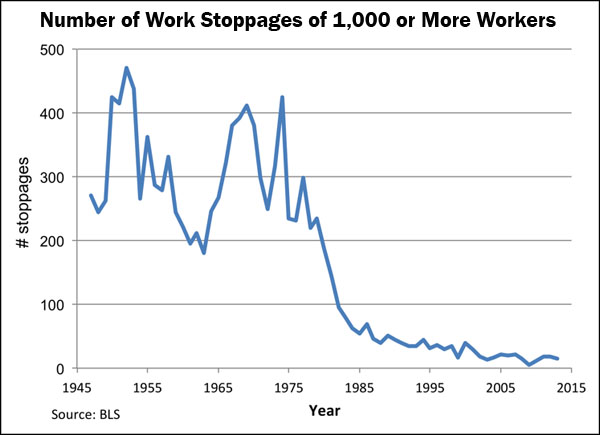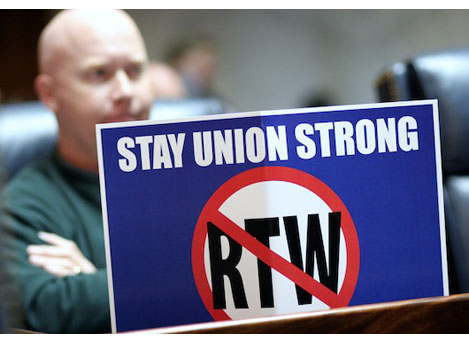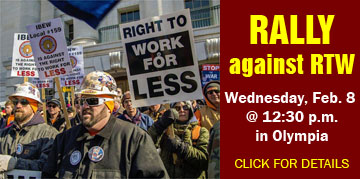OPINION
‘Right-to-Work’ is not about rights, it’s a cynical power grab
By STAN SORSCHER
OLYMPIA (Feb. 8, 2017) — We should see “Right-to-Work” legislation for what it really is.
Workers have surprisingly few rights in the workplace. We don’t have First Amendment rights to free speech. To the contrary, employers can hold “captive audience” meetings where workers are obligated to hear anti-union propaganda. We don’t have Second Amendment rights at work; no 4th Amendment rights against unreasonable search and seizure; no rights to dues process; no privacy rights, no 5th Amendment right against self-incrimination.
Your employer can legally search your belongings, tap your phone, read your email, tell you when and where you can eat, punish you for revealing your salary, and tell you what you can and can’t read on the Internet.
Under Washington state law, employers can fire workers for no reason at all. Well… unless you have a union contract. But even with a contract, your union must “demand” (delicious language, isn’t that?) that workers can only be terminated for just cause. Unions must fight for “just cause.” Employers strongly resist granting it.
At their core, Right-to-Work (RTW) laws say workers in America have too much power, and employers have too little.
Inequality is a defining problem of our time. How do workers get a share of the gains we produce? We can wait for someone to give it to us. We can demand it. Or maybe we don’t get it at all.
The classic form of worker power is a strike. The figure below tracks “work stoppages” — that is, strikes and lockouts. Strikes have just about disappeared. More and more, work stoppages are lockouts, where employers use their power to demand concessions from workers. So, who has too much power?

RTW puts us in a race to the bottom.
I recall a port strike in South Carolina. A state official said South Carolina was proud to have the lowest wages in the country. He would put port strikers in jail to keep it that way. Evidently you can get elected to office in South Carolina on that platform.
If South Carolina is the only RTW state, it can appeal to low-road employers based on low wages. If 25 states are RTW with low wages, then the appeal is diluted. If every state is RTW then no state has an advantage. Instead, workers everywhere give up their power, and gain nothing.
The logic of RTW says that if we all lower our standard of living a little faster, then everything will be OK.
State law has never required a single worker to join a union.
This comes as a surprise, given the way legislators push RTW.
If union members want a union-security clause in their contract — also known as agency fee, closed shop or fair share fees — they will make it a “demand” in bargaining. Over time, union members make it a priority, we put it into their proposals, and unions may need to strike to achieve this level of workplace strength. Employers don’t just “give away” union security. Workers trade something in the contract for the strategic advantage of greater power going forward.
 Once union security is in the contract, workers vote to approve the contract. We vote again, each time the contract is renewed.
Once union security is in the contract, workers vote to approve the contract. We vote again, each time the contract is renewed.
RTW is a restriction of rights — the right to contract.
Unions negotiate contracts with employers — binding legal contracts — the same kind of contracts that conservative think tanks defend to their last breath.
Why would a state restrict the right of two willing parties to negotiate a contract of their choosing? The state must believe that workers are too irresponsible to have the right to seek union-security language. Maybe the state thinks employers are too irresponsible to have the right to offer union security in negotiations.
It’s really about money and political power.
Democracy is already withering under campaign finance rules that compel candidates to please millionaire (and billionaire) donors.
RTW discourages democracy in the workplace. Its intent is to lower participation in a union, weaken labor as an institution of civil society, and reduce the number of workers who can vote on a contract.
Legendary campaign strategist Karl Rove teaches us to attack your opponent’s strength. For politicians promoting corporate power, first attack public employees and teachers, where union density is highest. Then attack stronghold states, like Michigan and Wisconsin. If unions fade as an institution of civil society, corporate power runs unchecked.
I remember a time when the purpose of public policy was to raise my standard of living. We all do better, when we all do better. The message of RTW is we will all do better when we all do worse.
 Stan Sorscher, a labor representative at the Society of Professional Engineering Employees in Aerospace (SPEEA), IFPTE 2001. His columns appear regularly at Huffington Post.
Stan Sorscher, a labor representative at the Society of Professional Engineering Employees in Aerospace (SPEEA), IFPTE 2001. His columns appear regularly at Huffington Post.






